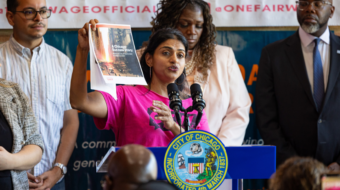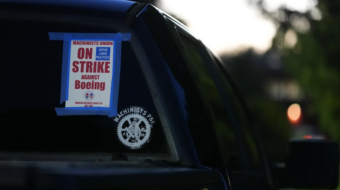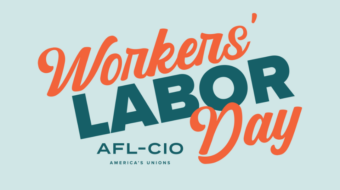
WASHINGTON—Paid sick leave, a key issue in last year’s worker-boss struggle over a new contract for 115,000 freight railroad workers, is still simmering among rank and file workers, seven months after Congress stepped in and imposed a contract on them.
The new pact, which averted a scheduled nationwide strike last Nov. 9, left paid sick leave up to carrier-by-carrier talks with the 14 rail unions. It certainly hasn’t been solved at Burlington Northern Santa Fe, one of the nation’s six big freight railroads.
Just ask Jennifer Ross, a working mother on that railroad and member of the Brotherhood of Maintenance of Way Employees Division/Teamsters Local 788. The 14-and-a-half-year veteran lays the situation there out in a two-minute video the union posted on YouTube.
“I have the distinct privilege of being one of the few BMWED members to do my job (while) pregnant,” she begins. “My son is nine. Ten years ago in 2012, I went to a fertility clinic to have my son, which is a lot of visits. Pregnancy in and of itself is a lot of visits and then after you have your baby, it’s a lot of visits.
“So unfortunately I also have the distinct pleasure of being one of the BMWED members who did not take vacation days for two years. Now that’s not to say I didn’t get vacation days, but I had to use every single one of them for doctor’s appointments,” she adds with a sigh.
“I had to use them to make my son, I had to use them to have my son, and I had to use them to take my son to his well visits because I want to be a good parent. And every year since half of my vacation days have been used to take care of my son. I don’t get the full amount of vacation days that the railroad says that I do, because I don’t get to take them as vacation.
“Even seven days of paid vacation”–her term for paid sick leave–“would make a world of difference in the amount of quality time I get to spend with my son—the son that I don’t see during the week because I travel for this job.
“I shouldn’t have to choose between spending quality time with him or taking him to the doctor, but I do. It’s grossly unfair because the executives and managers don’t have to do that, but I do.”
A check of various websites shows Ross is the rule, rather than the exception, so far. The railroads, flush with cash, are still being stingy with paid sick leave. And they’re still subjecting their workers in all crafts to erratic schedules, which often cause them to miss doctors’ appointments or work more than two weeks straight without a day off.
Those conditions affect thousands of more workers than the Maintenance of Way Employees at BNSF.
For example, in a positive development, the Brotherhood of Locomotive Engineers and Trainmen/Teamsters inked a paid sick leave pact with Norfolk Southern. Those 3,300 workers will get five paid sick days a year and the “flexibility” to use two of their vacation days as paid sick leave, too.
They’re the first group of BLE&T members, who account for about half of all rail workers at the nation’s six Class I freight railroads, to achieve paid sick leave.
That agreement follows pacts covering four paid sick days and the conversion of three more personal leave paid days to sick days for Norfolk Southern’s Signalmen, Smart-Transportation Division members, and Machinists District 19 members.
Everybody else is still out in the cold, a point Mark Wallace, BLE&T’s vice president, made in announcing the tentative agreement with Norfolk Southern. The workers must vote on it, though.
“For those workers who operate trains, engineers and conductors, who make up roughly half of the workforce at freight railroads, four days of paid sick leave was seen as insufficient,” he said.
“BLE&T also was and is opposed to any sick leave policy that penalizes workers for getting sick. It’s not in the public’s interest or our members’ best interest to have locomotive engineers and conductors handle some of the most dangerous items that any transportation group handles go to work sick or dangerously overtired because they’re worried about being penalized for making the safe choice,” Wallace added.
“The work of a locomotive engineer can be grueling,” said Jerry Sturdivant, the BLE&T’s general chair and one of the lead bargainers of the new sick leave tentative agreement. “Schedules are irregular, 12-hour runs are not uncommon.
“Our members are the hardest-working folks on the railroad. This agreement with Norfolk Southern recognizes the critical contributions our members make to keep the railroad and the American economy running. We thank NS for their collaboration in getting this deal done.”
We hope you appreciated this article. At People’s World, we believe news and information should be free and accessible to all, but we need your help. Our journalism is free of corporate influence and paywalls because we are totally reader-supported. Only you, our readers and supporters, make this possible. If you enjoy reading People’s World and the stories we bring you, please support our work by donating or becoming a monthly sustainer today. Thank you!










